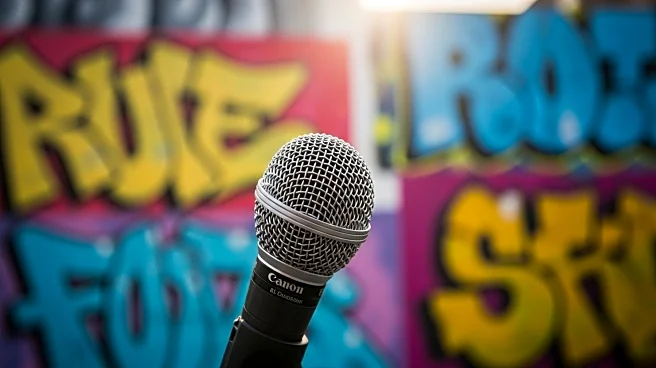What's Happening?
El Cousteau, a rapper from Washington, D.C., has released a new mixtape titled 'Dirty Harry 2,' which delves into his experiences growing up in the city. The mixtape arrives at a time when the Trump administration has increased federal law enforcement presence in D.C. to address what it calls a 'crime emergency.' Despite the administration's actions, violent crime in the city is reportedly at a 30-year low. Cousteau's music reflects his upbringing in D.C., capturing the essence of the city and its culture. His work is seen as a response to the gentrification and cultural shifts occurring in the area, echoing concerns previously raised by fellow D.C. rapper GoldLink.
Why It's Important?
The release of 'Dirty Harry 2' by El Cousteau is significant as it provides a cultural counter-narrative to the federal government's portrayal of D.C. as a crime-ridden area. The mixtape serves as a reminder of the city's rich cultural history and the resilience of its residents. Cousteau's music highlights the complexities of life in D.C., offering a perspective that contrasts with the federal crackdown. This artistic expression is crucial in preserving the cultural identity of D.C. amid ongoing gentrification and policy changes. It underscores the importance of local voices in shaping the narrative of their communities.
What's Next?
As the federal presence in D.C. continues, it is likely that local artists like El Cousteau will play a pivotal role in maintaining the cultural integrity of the city. The response from the community and local leaders to the increased federal intervention will be critical in determining the future of D.C.'s cultural landscape. Additionally, the impact of Cousteau's music on the national stage could influence broader discussions about urban policy and cultural preservation.
Beyond the Headlines
El Cousteau's work not only addresses the immediate cultural and social issues in D.C. but also raises questions about the long-term effects of federal intervention in local matters. The juxtaposition of his music with the current political climate highlights the ongoing struggle for cultural preservation in the face of external pressures. This situation reflects broader national trends where local cultures are often overshadowed by federal policies.










